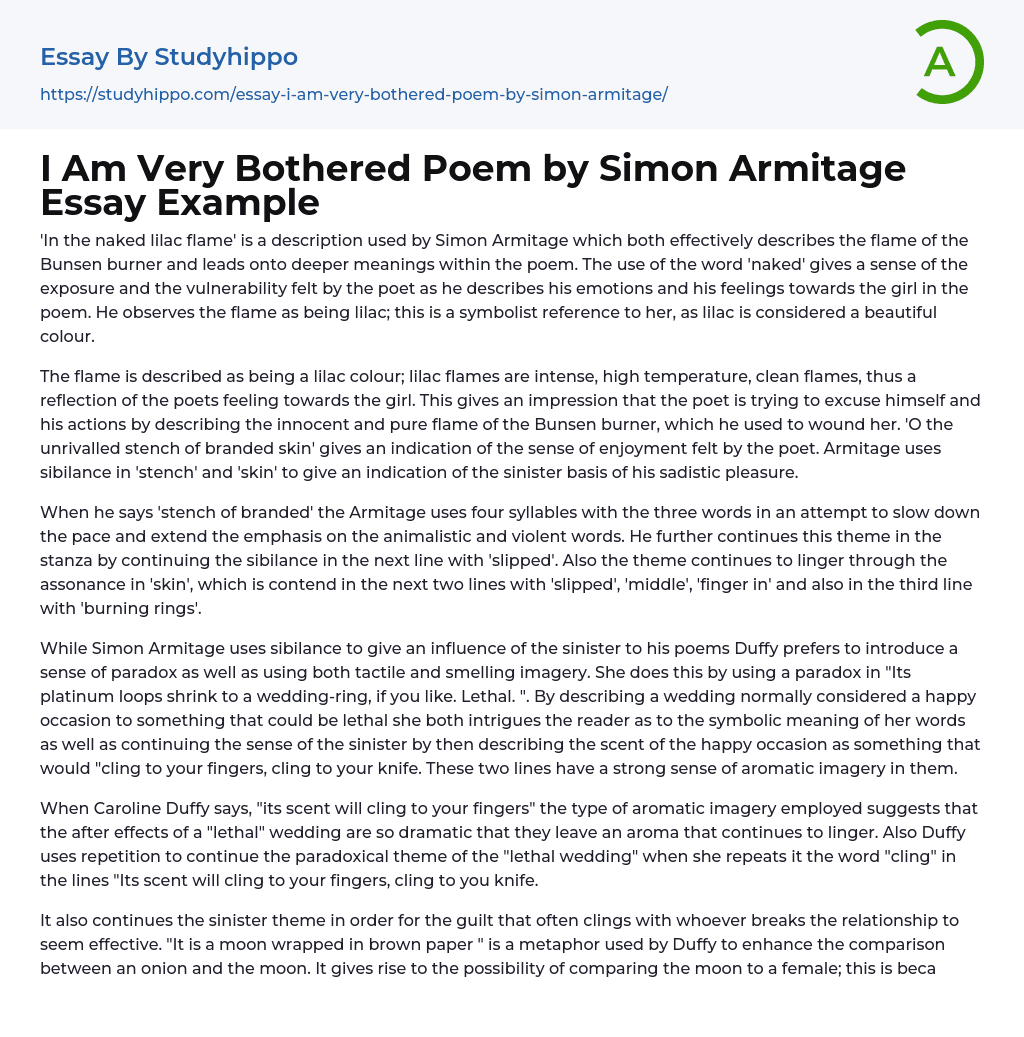'In the naked lilac flame' is a description used by Simon Armitage which both effectively describes the flame of the Bunsen burner and leads onto deeper meanings within the poem. The use of the word 'naked' gives a sense of the exposure and the vulnerability felt by the poet as he describes his emotions and his feelings towards the girl in the poem. He observes the flame as being lilac; this is a symbolist reference to her, as lilac is considered a beautiful colour.
The flame is described as being a lilac colour; lilac flames are intense, high temperature, clean flames, thus a reflection of the poets feeling towards the girl. This gives an impression that the poet is trying to excuse himself and his actions by describing the innocent and pure flame of the Bunsen burner, which he used to w
...ound her. 'O the unrivalled stench of branded skin' gives an indication of the sense of enjoyment felt by the poet. Armitage uses sibilance in 'stench' and 'skin' to give an indication of the sinister basis of his sadistic pleasure.
When he says 'stench of branded' the Armitage uses four syllables with the three words in an attempt to slow down the pace and extend the emphasis on the animalistic and violent words. He further continues this theme in the stanza by continuing the sibilance in the next line with 'slipped'. Also the theme continues to linger through the assonance in 'skin', which is contend in the next two lines with 'slipped', 'middle', 'finger in' and also in the third line with 'burning rings'.
While Simon Armitage uses sibilance to give an influence of the sinister to
his poems Duffy prefers to introduce a sense of paradox as well as using both tactile and smelling imagery. She does this by using a paradox in "Its platinum loops shrink to a wedding-ring, if you like. Lethal. ". By describing a wedding normally considered a happy occasion to something that could be lethal she both intrigues the reader as to the symbolic meaning of her words as well as continuing the sense of the sinister by then describing the scent of the happy occasion as something that would "cling to your fingers, cling to your knife. These two lines have a strong sense of aromatic imagery in them.
When Caroline Duffy says, "its scent will cling to your fingers" the type of aromatic imagery employed suggests that the after effects of a "lethal" wedding are so dramatic that they leave an aroma that continues to linger. Also Duffy uses repetition to continue the paradoxical theme of the "lethal wedding" when she repeats it the word "cling" in the lines "Its scent will cling to your fingers, cling to you knife.
It also continues the sinister theme in order for the guilt that often clings with whoever breaks the relationship to seem effective. "It is a moon wrapped in brown paper " is a metaphor used by Duffy to enhance the comparison between an onion and the moon. It gives rise to the possibility of comparing the moon to a female; this is because females are often compared to moons and thus gives the suggestion that she is talking about herself when she describes the onion being wrapped in brown paper.
Also the bulb of an onion is
comparable to the moon and that too suggests that the onion is symbolic of her being wrapped up and not appreciated. Duffy also uses a smile in the line "like the careful undressing of love" which compares the many layers of an onion to the many "layers" of a person, the outer layer being the person we want to be perceived as. It is a continuance on the subject of comparing a person to a moon wrapped in brown paper. The careful undressing suggests that we need to carefully undress these layers, removing any perceived notions to get to the real person underneath.
- Canterbury Tales essays
- Dulce Et Decorum Est essays
- My Last Duchess essays
- Beowulf essays
- Sir Gawain And The Green Knight essays
- The Road essays
- Aeneid essays
- Odyssey essays
- Blackberry Picking essays
- Beowulf Epic Hero essays
- American Literature essays
- Between The World and Me essays
- Book Report essays
- Book Review essays
- Book Summary essays
- Books essays
- Character essays
- Coming of Age essays
- Dante's Inferno essays
- Everyday Use essays
- Flowers for Algernon essays
- Genre essays
- Greek Mythology essays
- Incidents in The Life of a Slave Girl essays
- Letter essays
- Literary Criticism essays
- Literary devices essays
- Literature Review essays
- Metaphor essays
- Myth essays
- Play essays
- Plot essays
- Poem essays
- Poetry Analysis essays
- Protagonist essays
- Reader essays
- Reason essays
- Rhetoric essays
- Rhetorical Question essays
- Rhyme essays
- Simile essays
- Tragic Hero essays
- Translation essays
- Understanding essays
- Utopia essays
- Villain essays
- Writer essays




